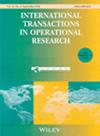提高大学效率:贝叶斯随机前沿分析
IF 3.1
4区 管理学
Q2 MANAGEMENT
引用次数: 0
摘要
在本文中,我们分析了西班牙公立大学系统在 2010-2019 年期间的表现,这一时期由于大学预算紧张而特别动荡。为了厘清绩效变化的主要来源,我们采用了一种动态方法,将其分解为效率变化(赶超)和技术变化(前沿变化)。与许多关于高等教育机构(HEIs)的研究不同,我们选择了随机前沿分析,采用了 Löthgren(1997 年)提出的射线生产函数来解释高等教育机构的多产出性质。此外,为了对不确定性量化进行更详细的研究,我们在贝叶斯范式中进行了推理。总体而言,研究结果表明,在整个期间,特别是在 2010-2014 年期间的技术变革方面,绩效总体呈正向变化。然而,各大学之间存在显著差异,这可以通过绩效及其组成部分的后验分布得到一定的精确度。本文章由计算机程序翻译,如有差异,请以英文原文为准。
Unlocking university efficiency: a Bayesian stochastic frontier analysis
In this paper, we analyze the performance of the Spanish public university system over the 2010–2019 period, which was particularly turbulent due to the tight budget constraints imposed on universities. To disentangle the main sources of performance change, we adopt a dynamic approach by decomposing it into efficiency change (catching up) and technical change (shifts in the frontier). In contrast to many studies on higher education institutions (HEIs), we opt for stochastic frontier analysis, employing the ray production function proposed by Löthgren (1997) to account for the multiple‐output nature of HEIs. Additionally, to offer a more detailed examination of uncertainty quantification, we conduct inference within the Bayesian paradigm. Broadly, results point to an overall positive performance change over the entire period, particularly for technical change during 2010–2014. However, there were notable discrepancies across universities, which could be unlocked with certain precision via the posterior distributions of performance and its components.
求助全文
通过发布文献求助,成功后即可免费获取论文全文。
去求助
来源期刊

International Transactions in Operational Research
OPERATIONS RESEARCH & MANAGEMENT SCIENCE-
CiteScore
7.80
自引率
12.90%
发文量
146
审稿时长
>12 weeks
期刊介绍:
International Transactions in Operational Research (ITOR) aims to advance the understanding and practice of Operational Research (OR) and Management Science internationally. Its scope includes:
International problems, such as those of fisheries management, environmental issues, and global competitiveness
International work done by major OR figures
Studies of worldwide interest from nations with emerging OR communities
National or regional OR work which has the potential for application in other nations
Technical developments of international interest
Specific organizational examples that can be applied in other countries
National and international presentations of transnational interest
Broadly relevant professional issues, such as those of ethics and practice
Applications relevant to global industries, such as operations management, manufacturing, and logistics.
 求助内容:
求助内容: 应助结果提醒方式:
应助结果提醒方式:


